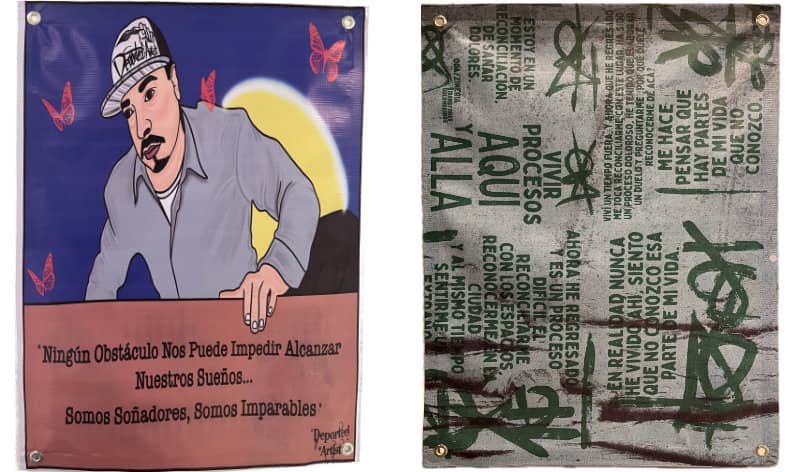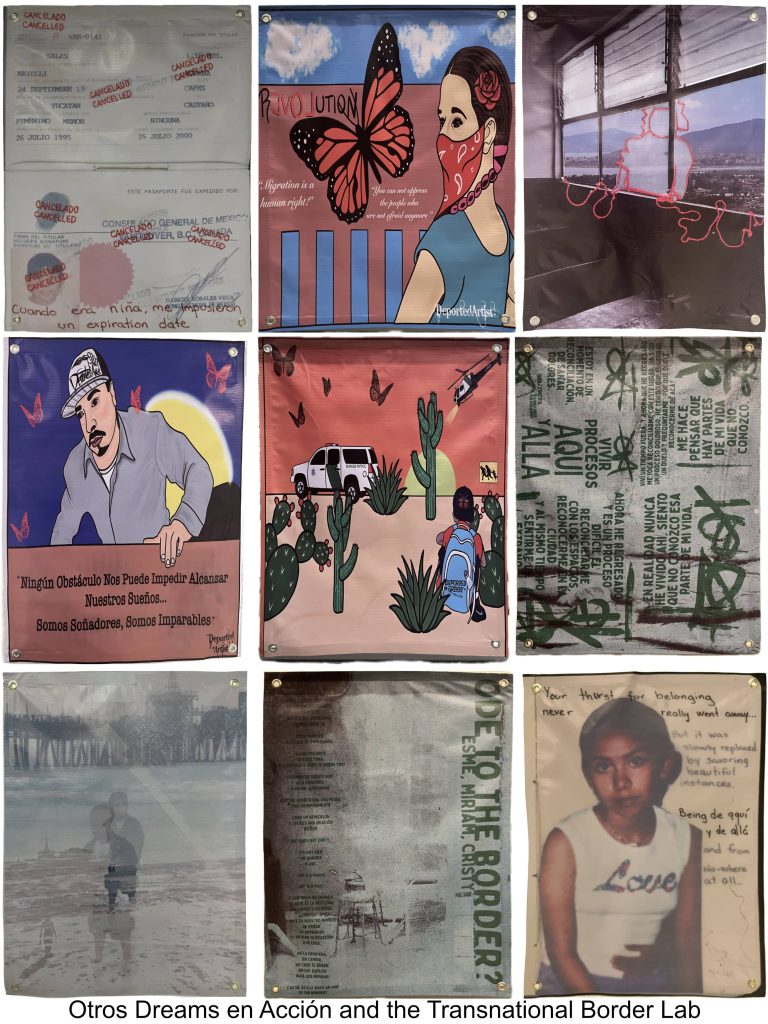
Dear friends,
We celebrate many new years in our neighborhood. Greetings to you in New Year 2024—according to the Gregorian calendar and its lineage of imperial time. (During the Roman Empire, Julius Caesar introduced an earlier version of the Gregorian calendar that abolished a lunar-based year, still marked in many global cultures).
Our first article of 2024 brings you a story of the art and cultural work of people who have been deported or returned to Mexico after growing up in the US. Next, we report on how the Mayor’s budget cuts to libraries ignore the important programming, outreach, and resources that New York’s public libraries offer immigrant communities and new arrivals.
Newsletter highlights:
- Making art out of the trauma of forced return
- Budget cuts threaten public libraries’ vital role for immigrants
1. “Pocha” Art at the New York–Mexico Border
Here in NYC, at the end of 2023, students and faculty at The New School’s Transnational Border Lab showcased the activist artwork they created during a semester working with Otros Dreams en Acción (ODA). The ODA was established in 2018 in Mexico City by Jill Anderson, a US researcher, and Maggie Loredo, who grew up in the US but was forced to return to Mexico. Their work is based in a cultural center for deportees and forced return migrants named Pocha House: ”The word pocha is a slur leveled at Mexicans whose speech and bearing show the traces of a childhood spent in the United States.”
Together, Loredo and Anderson have created numerous projects and presented their research findings about the people who have had to return to Mexico even though they never grew up there. In addition to their Ecologies of Migrant Care project, they self-published Lxs Otrxs Dreamers. The book combines art with the stories of those returned to Mexico and “bears witness to trauma and resilience in the face of immigration policies that have separated families for generations.” Some of those stories are also accessible through the Lxs Otrxs Dreamers website.
ODA, which is also a Spanish word meaning a poem to be sung, shares their artwork on Instagram. They also share news about their public presentations, such as a recent panel discussion for the Hemispheric Institute, to spread awareness of the human impact of deportation and forced return.
A sample of the images created at The New School were printed on plastic sheets with corner grommets, which allow them to be tied up outdoors. It evokes images of tarpaulin sheeting that is commonly seen throughout migrant refugee camps and temporary shelters. The artworks assemble images of deportation paperwork, the butterfly used by many immigrant advocacy groups, personal stories in written word, and the challenge to childhood that migrants face regularly.

The New School’s end-of-year event also included a screening of El Digno Retorno (A Dignified Return), a film by Jose Eduardo Aguilar. Aguilar has been doing a university and film festival circuit to advocate for opportunities in the film industry for the deported and returned community; provide resources to undocumented people who are thinking of returning or facing deportation to Mexico; and support through the Visa Justice Program the acquisition of B1/B2 nonimmigrant visas for deported and returned people to travel to the US.
Immigrant activism in the U.S. has a focus on immigrants staying in the country, but pocha activism is about the right to come and go between countries. As part of their Visa Justice Program, ODA has also created a petition for those who are deported or forcibly returned to be able to travel freely and safely between the US and Mexico.
WHAT CAN WE DO?
- Share and put to use the Ecologies of Migrant Care project.
- Sign the petition for visa justice.
- Follow ODA on Instragram.
2. Cuts to Libraries Threaten Lifeline for Immigrant New Yorkers
“…[T]he Mayor wrongfully blames recent asylum-seekers as the manufactured rationale for massive spending cuts. Rather than invest in public programs and public works as a way to create stability, opportunity, and economic mobility for people, he has chosen to balance the budget on the backs of low-income New Yorkers…” –City Council Member Shekar Krishnan, op-ed, AMNY (12/12/23)
NYC library budgets are an immigrant justice issue. While not as visible as other social services, the role of libraries and library programming to immigrant communities has been huge … and is now under attack. Mayor Adams’ announcement in November of a 5% cut across all city services—with the specter of an additional 5% cut coming this spring—was met by outcries and criticism, including his attempt to blame the draconian cuts on the “migrant crisis.” But the new year begins with the library cuts going into effect, and Sunday service is now eliminated citywide.
The reduced budgets threaten the future of a host of programs and services that NYC libraries offer immigrant communities. For years, people have been able to sign up at libraries for IDNYC, a government ID card accessible to anyone regardless of immigration status. Libraries offer free English classes; online and in-house citizenship resources including preparation for the Naturalization Interview and Citizenship Test; free immigrant legal services through the ActionNYC program; and confidential guidance for asylum seekers on health insurance, school enrollments, mental health services and more. NYPL has hosted over ten immigration resource fairs and created thousands of “Welcome Kits” in partnership with the New York Immigration Coalition. The Queens Public Library runs the New Americans Program with multilingual workshops on tenants’ rights, starting a business, parenting, career planning, and becoming a citizen.
At the most basic community level, libraries provide free access to the Internet and computers, a welcoming space for kids, and a warm space for grandparents in the winter. Now all New Yorkers, including immigrants, have lost those crucial supports on Sundays.
Even before the cuts, Queens libraries were struggling to meet the growing need of recent asylum seekers and other migrants. At the Jamaica branch, as many as 200 people lined up outside the library each day, a ten-fold increase over 2022. Last October, at the Jackson Heights and Elmhurst branch libraries, over 1500 people were shut out of classes that had already filled up weeks in advance. The Flushing branch had to set up a lottery for classes after a surge of migrant interest.
A spokesperson for the Mayor told library leaders that “due to the migrant crisis, granting further resources to them would be an example of ‘irresponsible spending’ that puts New Yorkers at risk.” Far from it. Cutting library budgets ignores the quiet but vital role that libraries play in supporting migrants and immigrant communities across the city.
UPDATE: In just the past two days, the Mayor has reversed some budget cuts (although not to libraries). Critics note that the move to restore selective funding demonstrates that the money has existed all along to protect essential services. Instead, several City Councilmembers claim, the severe cuts reflect the Mayor’s overinflation of the “migrant crisis” and his fiscal mismanagement of the city.
WHAT CAN WE DO?
- Support #NoCutsToLibraries. Sign the pledge supporting Queens Public Library.
In solidarity and with collective care,
Jackson Heights Immigrant Solidarity Network (JHISN)
Follow @JHSolidarity on Facebook and Twitter and share this newsletter with friends, families, neighbors, networks, and colleagues so they can subscribe and receive news from JHISN.